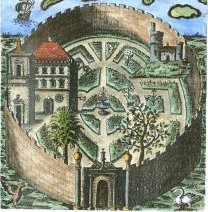
There is an expression, the walled garden, that is applicable to the way libraries (and other online content providers) viewed their services. It was a special place that could only be reached via certain routes and portals. Libraries are not the only culprits here. Database providers and publishers are (were?) locked into this way of thinking. The deliberate obstacles created to maintain these gardens discourage users and send them elsewhere. Today's young netizens expect things to play reasonably well together. They wish to be able to grab whatever from where ever. For example, a person could quite easily, have pictures on Flickr, videos on Youtube, documents at Google Docs, links on Delicious, and updates on Twitter and tie it all together with a Facebook page. The garden walls are coming down because that's what people want and there are companies that are making money by being welcoming and cooperative
Having said all of that, I would like to point out two examples this change being embraced. The first is Yahoo Pipes. This is an amazing tool that allows users to take information available from the internet at large and reprocess it. In my first experiment with this tool, I took RSS news feeds from four different sources (Yahoo!, Google, ALA, and Library Journal), filtered their collective articles for the words library, librarian, libraries in either the title or description and then sorted those results by date. The output is viewable here. This simple exercise barely scratches the surface of what this tool is capable of. Check out the tutorial.
My second example is an initiative from the folks over at Wright State University in Ohio. They have announced that they are looking to implement a "comprehensive discovery layer" to access the total collections of all OhioLINK systems. What this means to the rest of us is that they would like to create a way to search, from a single starting point, books and other media as well as databases and other special collections. Imagine typing in your search and getting books from multiple systems as well as images, maps, newspaper and magazine articles, and database entries and all presented in a coherent, single list. Well, that is the plan at least according to the people over at Disrputive Library Technology Jester. That would be pretty awesome.




No comments:
Post a Comment